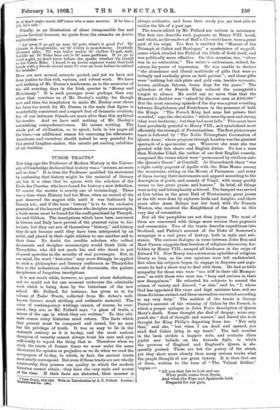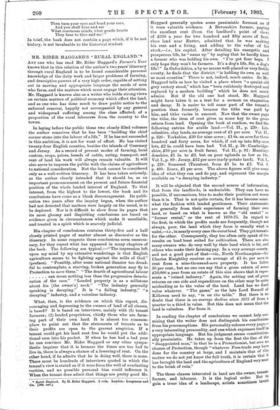lLOOR TRACTS.*
NOT long ago the Professor Of Modern History in the Univer- sity of Cambridge declared that history was a" science, no more and no less." It is true the Professor qualified his statement by confessing that history might be the material of literary art, but it is clear that he agrees with the scholars of the Ecole des Chartes, who have found for history anew definition. Of course the matter is merely one of terminology. There was a time when History had her Muse, when no record of the past deserved the august title until it was fashioned by literary art ; and if the term " history " is to be the exclusive possession of the learned gentlemen who decipher manuscripts, a fresh name must be found for the craft practised by Thucydi- des and Gibbon. The inscriptions which have been recovered in Greece and Italy have proved of the greatest value to his- torians; but they are not of themselves "history," and history they do not become until they have been interpreted by an artist, and placed in their right relation to one another and to their time. No doubt the erudite scholars who collect documents and decipher manuscripts would think little of Thucydides, who did not quote his, and who dared to put eloquent speeches in the mouths of real personages. But, to our mind, the word "historian" may more fittingly be applied to such a philosopher and literary craftsman as .Thucydides than to the industrious collectors of documents, the patient decipherers of forgotten inscriptions.
It is not worth while, however, to quarrel about definitions, and we would not for one moment underrate the admirable work which is being done by the historians of the new school. Mr. Pollard, for instance, has given us in his volume of Tudor Tracts, collected from Mr. Arbor's well- known Garner, much striking and authentic material. The value of contemporary writings cannot, of course, be over- rated; they are, as Mr. Pollard says, "a glass of truth, a mirror of the age in which they are written." To this ulti- mate source every historian must return. The facts which they present must be compared and tested, for no man has the privilege of truth. It was as easy to lie in the sixteenth century as it is to-day, and the most zealous champion of veracity cannot always trust his ears and eyes sufficiently to report the thing that is. Therefore when we study the tracts of former times we must make the same allowances for opinion or prejudice as we do when we read the newspapers of to-day, to which, in fact, the ancient tracts most nearly correspond. But even if these tracts are not wholly trustworthy, they possess one quality to which the modern historian cannot attain : they have the very style and accent of the time. If their facts are distorted, their manner is ..• Tudor Tracts, tass-isas, With au latroduotion by A. 1", Pollard. London i.
uonstablo and Co, 1.1.4 • • •
always authentic; and from their study you are beet able to realise the life of a past age.
The tracts edited by Mr. Pollard are various. in substance. The first two describe such pageants as Henry VIII. loved, and which, as the readers of Hall's Chronicle know, were a great part of his reign. The first is entitled the "Manner of the Triumph at Calais and Boulogne," a masterpiece of magnifi- cence which rivalled the Field of the Cloth of Gold itself, and was politically more effective. On this occasion, too, "silver was in no estimation." The writer's enthusiasm, indeed, far outran his power of expression. He was unable to declare "the abundance and liberal multitude of gifts that were so lovingly and cordially given on both parties " ; and these gifts were "nothing but rich plate and gold coin, besides raiments, horses, geldings, falcons, bears, dogs for the game." The splendour of the French King reduced the panegyrist's tongue to silence. He could say no more than that the Monarch's doublet was "valued by discreet men at E100,000." But the most amusing episode of the day was a great wrestling between Englishmen and Freachmen in the presence of both the Kings. "The French King had none but priests that wrestled," says the chronicler, "which were big men and strong (they were brethren) ; but they had most falls." This must have been peculiarly grateful to Henry VIIL, as it symbolised most efficiently the triumph of Protestantism. The first picturesque tract is followed by "The Noble Triumphant Coronation of Queen Anne," whose progress through London was the greatest spectacle of a spectacular age. Wherever she went she was greeted with fair shows and English ditties. No leas a man than Nicholas Udall, the author of our first English comedy, composed the verses which were "pronounced by children unto the Queen's Grace" at Cornhill. At Gracechurch there "was a right costly pageant of Apollo with the Nine Muses among the mountains, sitting on the Mount of Parnassus : and every of them having their instruments and apparel according to the description of poets, and namely of Virgil; with many goodly verses to her great praise and honour." In brief, all things were nobly and triumphantly achieved. The banquet was served at four tables in the great Hall of Westminster, great jousts at the tilt were done by eighteen lords and knights, and three years after Anne Boleyn lost her head, with Sir Francis Weston, who received the Knighthood of the Bath on this very day of coronation.
But all the pamphlets are not thus joyous. The most of them are concerned with things more serious than pageants and ceremonies. Two of the tracts describe expeditions into Scotland, and Patten's account of the Duke of Somerset's campaign is a real piece of history, both in style and sub- stance. The curious dialogue in verse between John Bon and Mast Parson suggests that freedom of religious discussion, for- bidden by Henry VIII., escaped all hindrance in the reign of Edward VI. Now Henry was a strenuous upholder of religious liberty so long as his own opinions were left undisturbed. But when his subjects began to engage in disputes and argu- ments he had a short way to deal with them. He had as little sympathy for those who were "too stiff in their old Kumpel- mus," as with those who were too "busy and curious in their new Sumpsimus." He exhorted his subjects to amend the crimes of variety and discord, "or else," said he, "I, whom God has appointed His vicar and high minister here, will see these divisions extinct and these enormities corrected according to my very duty." The saddest of the tracts is George Ferrer's account of the winning of Calais by the French, to which a proper epilogue is John Fox's description of Queen Mary's death. Some thought she died of dropsy; some sup- posed she "died of thought and sorrow," and feared she took thought for King Philip's departing from her. "Not only that," said she, "but when I am dead and opened, you shall find Calais lying in my heart." The last number in the book strikes a happier note, and contains three joyful new ballads on the Armada fight, in which the prowess of England and England's Queen is elo- quently praised. These are but the poetry of the street, yet they show more clearly than many serious works what the people thought of our great victory. It is thus that one of them, written to the tune of "The Valiant Soldier,"
begins :— "AU you that list to look and see
What profit comes from Spain, And what the Pope and Spaniards both Preparkl for our gain,
Then turn your eyes and bend your ears, And-you shall hear and see What courteous minds, what gentle hearts They bear to thee and me !'
In brief, the book does not contain a page which, if it be not history, is not invaluable to the historical student.







































 Previous page
Previous page